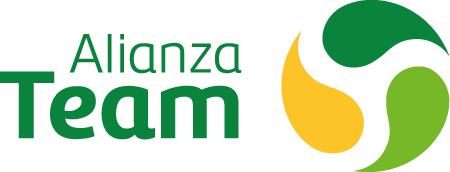



2020 was a year of great progress for Alianza Team® in terms of our approach towards our allies and the reinforcement of priorities for the following years. Aware of the importance of our suppliers and understanding the risks present in the supply chain, we developed tools that today allow us to diagnose, evaluate, and develop initiatives together with them to mitigate these risks and strengthen the entire chain. The pandemic highlighted how vulnerable global supply chains are to external shocks, and with the ongoing threats posed by climate change among others, it is our duty to work hand in hand with our partners to prepare for future challenges. In line with our corporate principles and values, and based on the Policy Guidelines for Nurturing a Better Tomorrow we designed the Responsible Sourcing Strategy that will guide our actions on this front in the short and medium term.
HIGHLIGHTS:
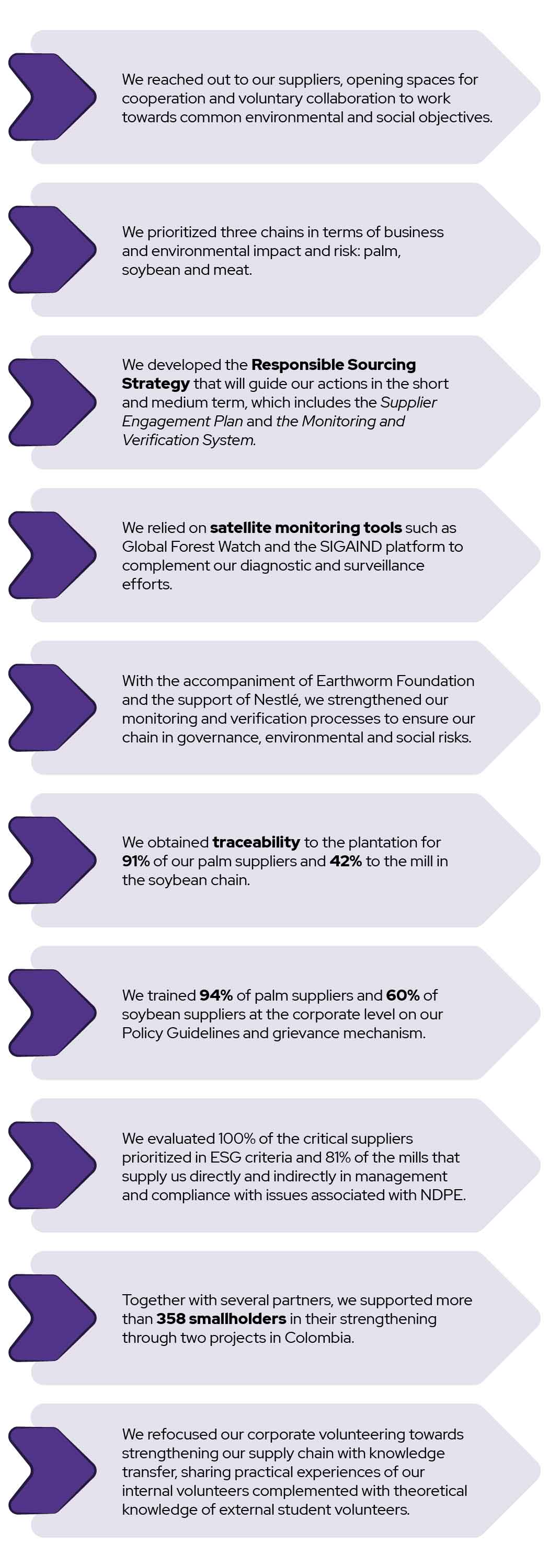
2023 CHALLENGES:
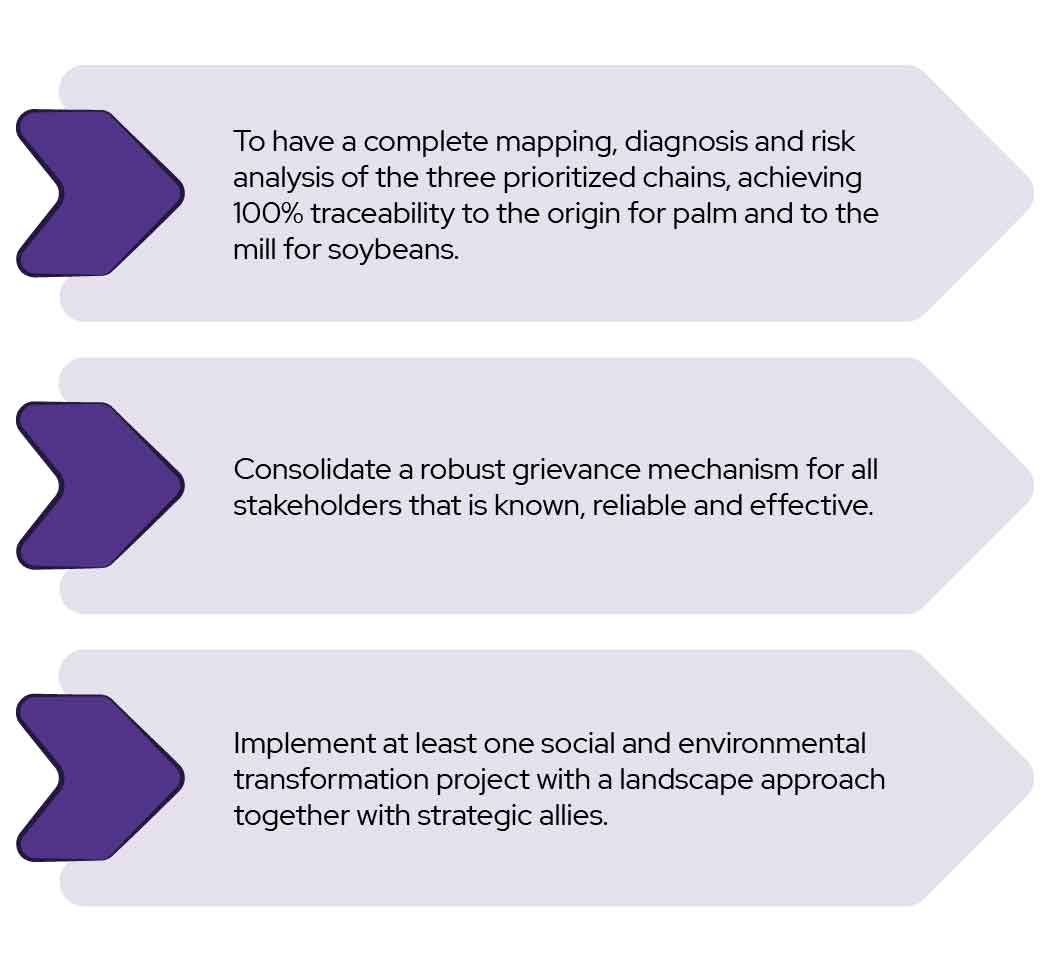
2030 AMBITION:
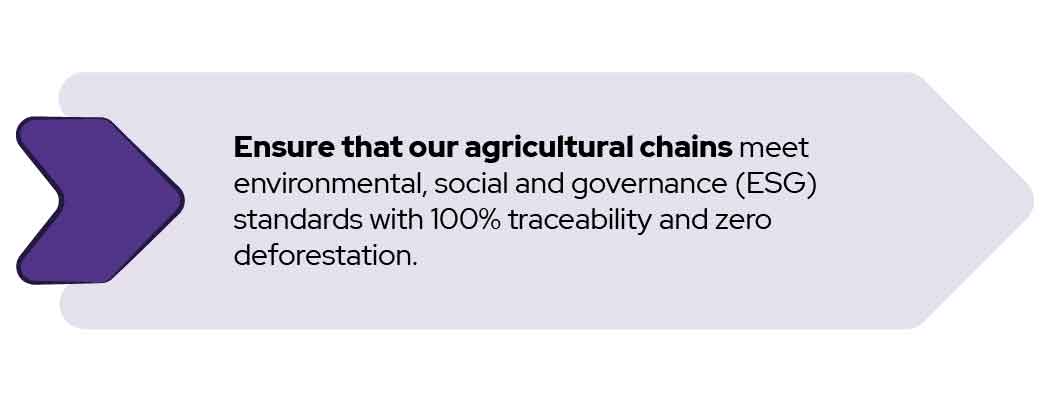
Read more
Procurement mapping:
[102-9; 204-1]
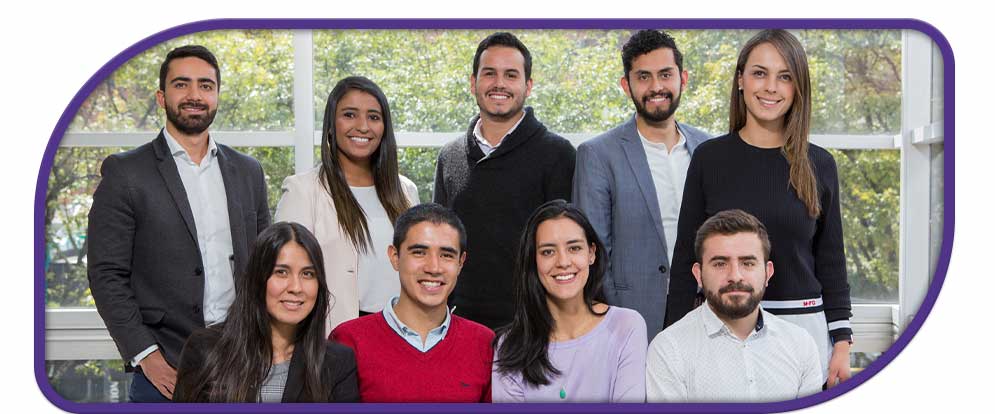
Corporate Finance and Procurement team
We organize our procurement strategy in a way that allows us to have a close understanding of the market, risks, opportunities and key players in each of the supply categories under which we work: lipid raw materials, packaging materials, inputs and ingredients, non-productive elements and administrative services. 2020 reinforced the importance of getting to know our suppliers, assessing their strengths but also understanding their opportunities, in order to establish action plans that strengthen trust in our relationships, develop and add value to our suppliers and the full chain in line with our corporate commitments and objectives. Of the approximately two thousand suppliers we have, our main focus is on lipid raw materials, which represent more than 85% of the total spend, followed by packaging materials, which represent approximately 5%. We seek to develop local capabilities in our sourcing, so more than 60% of our supply comes from Latin America, contributing to the economic development of the region. In terms of social and environmental impact, we verify that 100% of our suppliers know and comply with our Policy Guidelines in which we specifically detail the different corporate commitments and expectations in the economic, environmental and social dimensions.
We prioritized three strategic chains by purchase volume and impact on business and the environment: palm, soybean and meat. We designed and initiated the implementation of the evaluation and monitoring system starting with the palm and soybean chain and with plans in 2021 for the meat chain. Traceability at origin is a fundamental component for environmental and social risk management, identifying early signs and warnings with the support of satellite monitoring tools such as Global Forest Watch, among others, which allow us to complement our efforts in avoiding deforestation for example. The goal set for 2019 was to achieve 100% traceability to the plantation and mill for our palm, palm kernel oil and derivatives, an important challenge considering that we estimate approximately 12,805 indirect suppliers in our supply chain, of which 2,254 are considered smallholders (>50Ha cultivated). Traceability at origin in the soybean chain presents a series of different complexities, as trading and sales are done through large players that are only recently beginning to identify their producers in the field.
The path to supply chain assurance:
[T5]
Timeline
Responsible Sourcing Strategy:
[102-17]
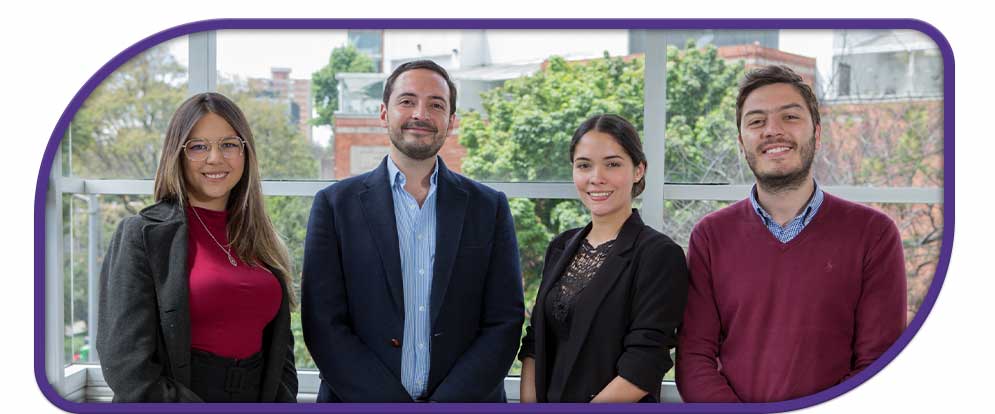
Alianza Team® Legal team





With the support of Earthworm Foundation and our client Nestlé, we developed our responsible sourcing strategy as a roadmap until 2030 that describes the strategies and activities to be developed, implemented and adjusted internally and externally. The evaluation and monitoring system will be an input for decision making and assurance of compliance with our social and environmental commitments in our supply chains, and the supplier engagement plan details our relationship and joint work, thus ensuring sustainable and responsible sourcing.
Guaranteeing the mainstreaming and compliance with the social and environmental commitments stated in the Alianza Team® Policy Guidelines is one of our main objectives to be fulfilled in the organization's processes and in the operation of our supply chain. Likewise, to expand the disclosure of our corporate integrity line, the main channel for complaints, claims and reports for our stakeholders.
Corporate Integrity Line:
https://teamfoods.alertline.com
Telephone lines: Colombia: 01800 911 0011 Mexico: 01800 288 2872 Chile: 800 360 312
Once connected, dial 888-265-9894 and select the language. Each person will get a PIN to return to the system and receive feedback on their reported case.
We want to promote development together with our strategic allies throughout the chain, so this strategy responds to 5 of the material issues prioritized for Alianza Team®: Traceability, ESG compliance (environment, social and governance) in suppliers, supplier development, partnerships for development, and risks, human rights and compliance to ensure a better tomorrow for future generations.
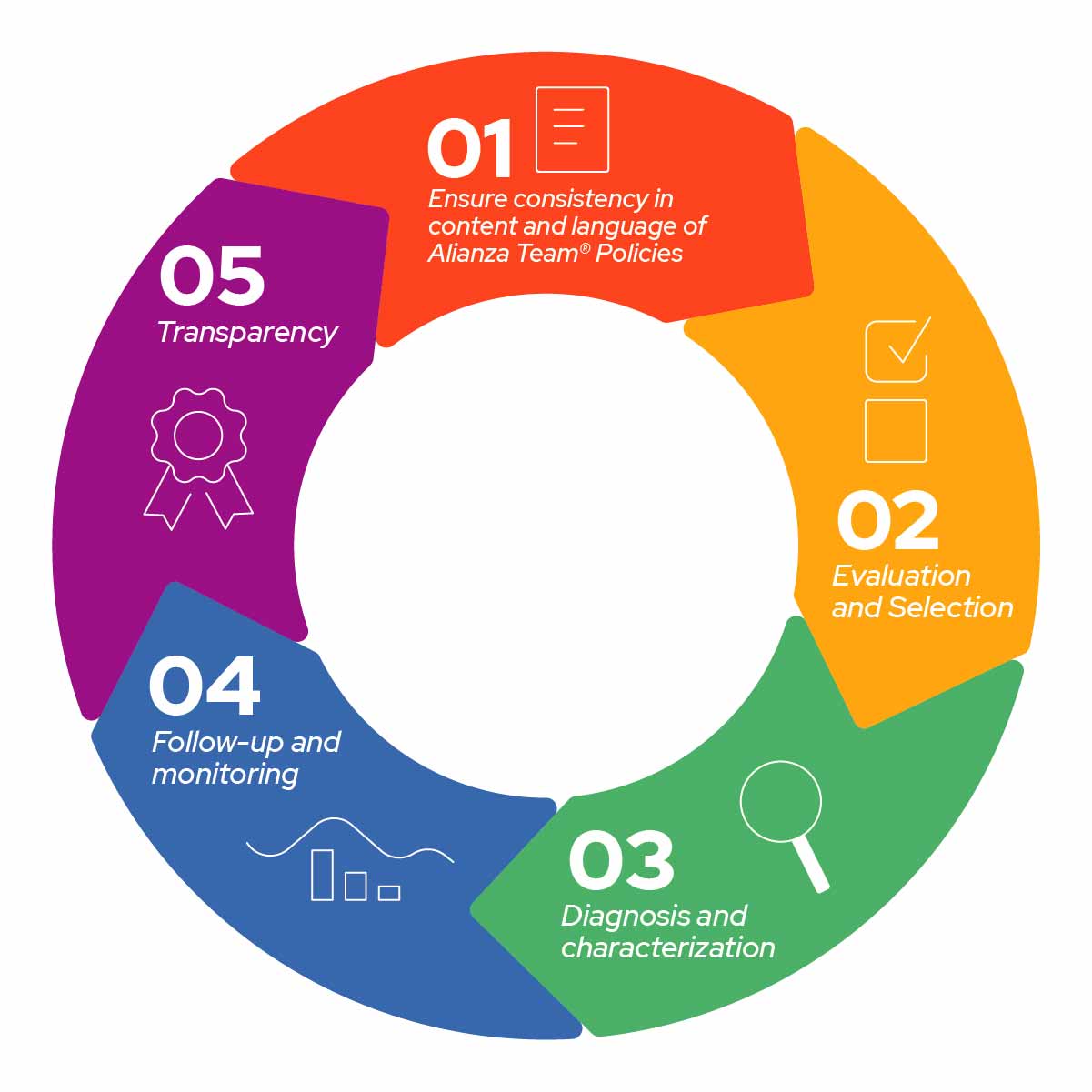
- Ensure consistency in content and language of Alianza Team® Policies.
-
- Timely risk management and compliance with our main commitments.
- Raising awareness and mainstreaming social and environmental commitments within the framework of our corporate policies and processes for strategic allies (clients, suppliers, NGO's).
- Evaluation and Selection
-
- Incorporation of sustainability criteria in the evaluation of suppliers.
- Supplier development.
- Contractual controls for risk mitigation.
- Diagnosis and characterization:
-
- Sustainability risk analysis:
- Supplier assessment
- Mapping of the palm (traceability to origin and crop polygons), soybean (traceability to mill and bean origin) and meat supply chain.
- Follow-up and monitoring
-
- Visits to prioritized critical suppliers
- Work plan and follow-up
- Alianza Team® grievance mechanism
- Non-conforming supplier management
- Transparency
-
- Internal and external Supplier engagement plan progress bulletins
- Awareness-raising and internal work sessions
- Publication of our palm oil sourcing (long term)
The monitoring and verification system in the chain, a fundamental component of our strategy, covers critical environmental, social and governance aspects in agricultural chains, such as NDPE commitments (no deforestation, no peat, no exploitation), application of the HCS/HCV methodology, human rights, grievance mechanisms, traceability, monitoring and transparency, among others. During the second half of 2020 in six sessions we identified the necessary adjustments to align our internal procedures with our declared commitments. With these results, we adjusted the entire system and the visit and verification plan to continue promoting best practices in our supply chain. In 2021, we will conduct the pilot visit for the implementation of these tools.
Alianza Team® supplier engagement plan in numbers:
- We trained 94% of palm suppliers and 60% of soybean suppliers at the corporate level with respect to the commitments declared by Alianza Team® in environmental, social and governance (ESG) aspects and our grievance mechanism detailed in the Policy Guidelines.
- We evaluated 100% of our prioritized critical palm suppliers on ESG issues and 81% of the mills that supply us directly and indirectly on management and compliance with ESG issues.
- We continued to support 100 indirect palm fruit suppliers in the joint project with partners from all links of the chain for certification under the new RSPO smallholders standard for the second half of 2021. This certification was originally planned for 2020 but was postponed due to the pandemic.
- We worked with 92 smallholders of palm fruit on satellite monitoring of their crops, identifying properties located in protected areas, agricultural frontier, conservation areas and/or presence of deforestation, along with the characterization of ESG issues for one of our suppliers sourcing, with the support of the National Wildlife Federation (NWF), Proyección Ecosocial and the SIGAIND platform.

- We began field visits to our prioritized critical suppliers.
Traceability to origin:
[T4]
Our commitment to sourcing raw materials in a responsible and sustainable manner, along with mitigating the effects of climate change, protecting and preserving forests, protected areas and biodiversity in our supply chain has allowed us to map in detail our palm and soybean chains in the last 18 months through voluntary agreements to deliver information, getting to know the origin of our palm and palm kernel oil and derivatives up to plantation of 91% of our suppliers and 81% of the mills. Although we have not reached our corporate target of 100% due to a lag of approximately
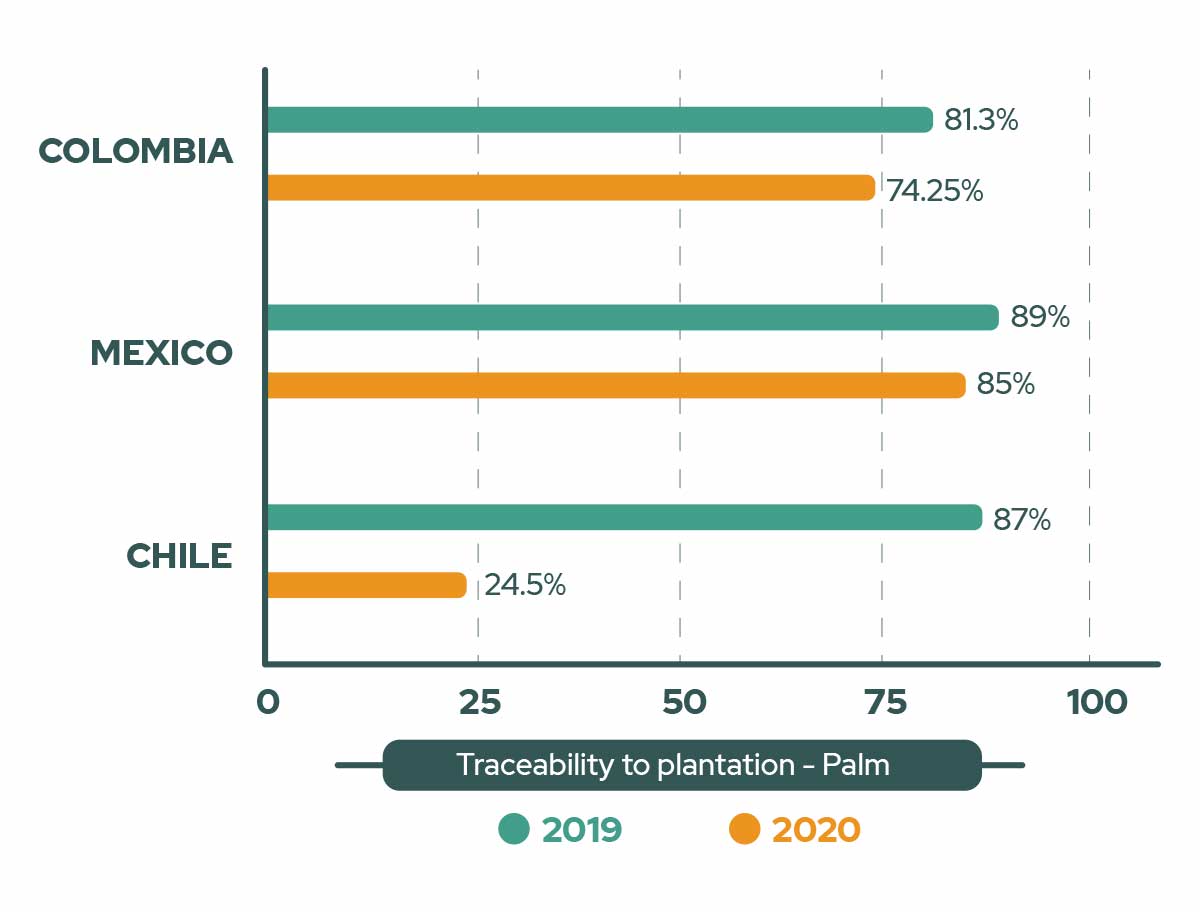
Our commitment to increase traceability to the mill in the soybean chain, also through voluntary agreements with our suppliers, has allowed us to better understand the complexities of this chain, where the level of detail and difficulty in capturing this information is a challenge for our partners and for the organization. We currently have 42% traceability to the mill for our soybean supply.
The Voluntary Agreement for Zero Deforestation in the palm oil chain in Colombia which we signed in 2017 and extended to the corporate level, has been key for moving forward in this front. We delivered to the Committee our analysis report of our chain as a base tool for the identification, validation and mitigation of possible cases of deforestation, reinforcing the importance of the information we have for the development of the different tools described.
Corporate Volunteering Aliados Somos +:
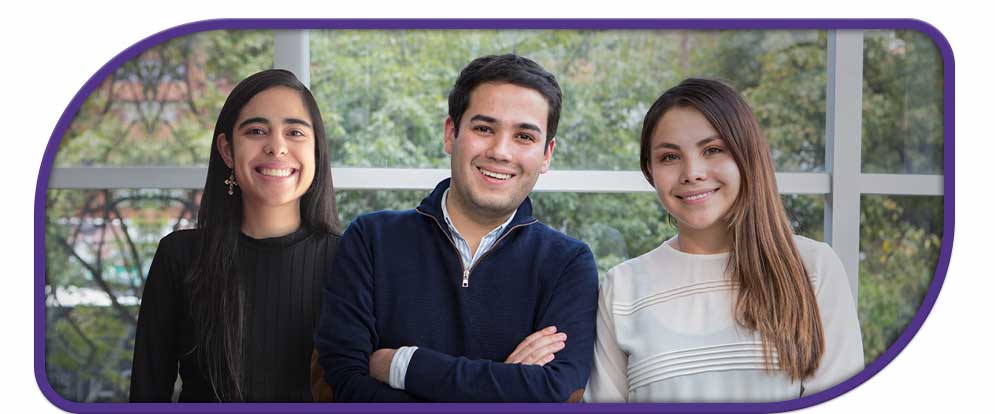
Alianza Team® Sustainability team

We transformed our corporate volunteering towards strengthening our supply chain. We sought to transfer best practices in ESG topics to our suppliers, creating knowledge circuits and work sessions with internal volunteers from Alianza Team® and university students in their last semester -external volunteers- from the Universities of La Sabana, Externado de Colombia and Los Andes in Bogota. Combining the practical knowledge of the internal volunteers with the theoretical knowledge of the external volunteers, this approach allowed our suppliers to advance in topics that they themselves considered of interest for their development. For our external volunteers, who as a result of the pandemic were left without internship opportunities, it was a very enriching experience in preparation for the start of their working lives, and for us it was the opportunity to identify high potential talent for future vacancies and needs.
In 2020, we had the participation of 8 suppliers of raw materials, inputs and packaging to whom through 417 hours of work, 6 webinars and 27 sessions, we shared best practices in the following topics: occupational health and safety, human rights, environment, risk management, community relations, grievance mechanisms, labor practices, responsible marketing and sustainability. In the case of our raw material suppliers, we reached 41% of the total palm and palm kernel oil supply in Colombia. We will launch the second cycle in the first half of 2021 in which we will continue to share knowledge and strengthen our relationships with voluntary suppliers to further strengthen our chain and in the second half of 2021, broaden its reach to Mexico.
Click on the section you are interested in to continue:
Chapter 0
Who we are
Chapter 1
What we do
Our products, brands and technological solutions contribute to the well-being of millions of consumers, based on science to make a difference through lipids.
Chapter 3
How we do it
Our people and processes are at the core of our operation, seeking to ensure safety, quality, development, well-being and positive impact in everything we do.
Suscríbete a nuestro Newsletter
Entérate de novedades en la alimentación
